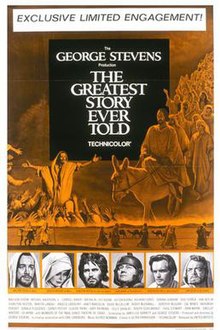| The Greatest Story Ever Told | |
|---|---|
 Theatrical release poster | |
| Directed by | George Stevens |
| Screenplay by | George Stevens James Lee Barrett |
| Based on | The Greatest Story Ever Told by Fulton Oursler Henry Denker Bible |
| Produced by | George Stevens |
| Starring | Max von Sydow José Ferrer Charlton Heston Dorothy McGuire |
| Cinematography | Loyal Griggs William C. Mellor |
| Edited by | Harold F. Kress Argyle Nelson Jr. Frank O'Neil |
| Music by | Alfred Newman |
Production company | George Stevens Productions |
| Distributed by | United Artists |
Release date |
|
Running time | 199 minutes (see below) |
| Country | United States |
| Language | English |
| Budget | $20 million[1] |
| Box office | $15.5 million[2] |
The Greatest Story Ever Told is a 1965 American epic religious film retelling the Biblical account of Jesus of Nazareth, from the Nativity through to the Ascension. Produced and directed by George Stevens, with an ensemble cast, it features the final film performances of Claude Rains and Joseph Schildkraut.
The Greatest Story Ever Told originated as a half-hour radio series in 1947, inspired by the four canonical Gospels. The series was later adapted into a 1949 novel by Fulton Oursler. In 1954, Twentieth Century Fox acquired the film rights to Oursler's novel, but development stalled for several years. In November 1958, Stevens became involved with the project, which he agreed to write and direct. However, in September 1961, Fox withdrew from the project because of uncertainty concerning its presumptive cost and its thematic similarities to King of Kings (1961), another religious biopic of Jesus.
A few months later, Stevens moved the project to United Artists. He decided to film the project in the Southwestern United States, rather than the Middle East, and principal photography began on October 29, 1962. Filming fell behind schedule due to Stevens' tedious shooting techniques; David Lean and Jean Negulesco were brought in to film some sequences. The film wrapped on August 1, 1963.
The film premiered at the Warner Cinerama Theatre in New York City on February 15, 1965 to a polarized response from film critics.[3] It was also a box office disappointment, earning $15.5 million against a $20 million budget. It did receive five Academy Award nominations.
- ^ Moss 2004, p. 285.
- ^ "The Greatest Story Ever Told (1965)". The Numbers. Retrieved January 22, 2013.
- ^ Moss 2004, p. 287.